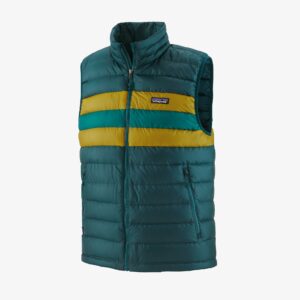We’ve read the reviews across the web for the Patagonia Down Sweater Vest – Men’s and summarize the results below:

Universal Ranking
PeakScore: 95 (out of 100)![]()
User Rating: 4.7 stars ![]()
Expert Rating: 5 stars ![]()
Number of Ratings Reviewed: 205
Pros & Cons
Reasons to buy:
User Reviews
- Durable material to withstand wear-and-tear.
- Packs down into chest pocket.
- Down allows it to remain warm in colder temperatures.
- Some windproof capabilities.
- DWR finish to increase water-resistance.
- Layers well and versatile.
- Fits under a shell or a heavier jacket.
- Elastic around the arm enhances a snug fit.
- Variety of colors.
- Adjustable waist elastic.
- 800-fill power down for warmth.
Expert Reviews
- Durable stitching.
- Fabric pocket for the zipper under your chin.
- Stacked-stitching in the collar keeps the down from moving around.
- 20-denier fabric allows for durability.
- Interior chest pocket has a two-sided zipper.
- The shell and the interior lining have a soft feel.
- Horizontal stitching on the quilted construction shows good workmanship.
- 20x30D fabric is lightweight.
- Along the waist, there is an elastic drawstring that can prevent air from coming in.
- Loop to attach to a carabiner for storage.
Reasons NOT to buy:
User Reviews
- Zippers catch frequently.
- Discrepancies in sizing.
- Larger baffles on the neck allow for airflow and can let cold air inside.
- A slightly more athletic cut that some users may not like.
- No inner liner in the hand pockets.
- Not as thick as a regular down vest but warm enough from the mid-30s and above.
- Arm openings are non-adjustable.
- Expensive.
Expert Reviews
- Single stitched to the vest without reinforcing, which makes snagging possible.
- Windproof and water-resistant ability is questionable.
- The down wets out in prolonged precipitation.
- Length is a little short.
Summary:
The Patagonia Down Sweater Vest for men is a lightweight, durable, warm, and compact piece that is ideal for layering in colder climates. The lack of weatherproof material would not be good as an outer-layer in precipitation, but the warmth and compressibility make this a good choice for a mid-layer in freezing temperatures.
